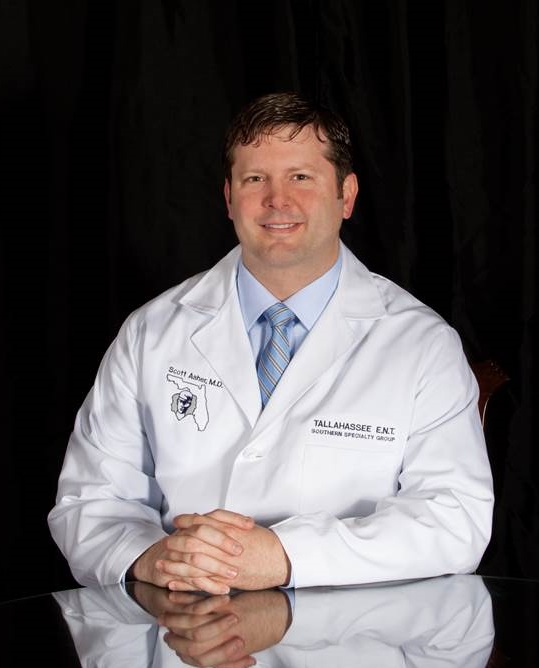 When did you graduate from UAB?
When did you graduate from UAB?
I completed ENT residency at UAB in 2013.- Where are you now?
I joined a private practice in Tallahassee, Fla. that is affiliated with the FSU medical school, so we also get to mentor med students, general surgery residents, internal medicine residents and family practice residents that rotate through our group. Although it’s not an academic position, we are definitely a hybrid and do a lot of teaching. - What are your clinical/research interests?
After residency I went on to complete a fellowship in facial plastic and reconstructive surgery with Dr. Dean Toriumi. Our recent publications have been focused on clinical outcomes after rhinoplasty. - How did you choose to practice this area of otolaryngology?
Believe it or not, Dr. McGrew was actually the first to suggest I consider doing plastics… Maybe it was because he saw I paid great attention to detail, or maybe because he thought I was lousy at drilling mastoids. Either way, he was very influential on my developing career, and helped me see that my personality and skill set fit plastics well. - What aspect of your time at UAB do you believe was most valuable as you started your career?
When I was at UAB, Drs. Peters/Carroll/Rosenthal/Magnuson ran one of the busiest head and neck programs in the country. Drs. Wiatrak/Woolley/Hill/Shirley/Kulbersh/Smith took care of some of the most complex pediatric ENT patients in the region. We had fantastic faculty in the other subspecialties as well, and I got great training in rhinology, laryngology, otology, and plastics. When I came out of residency, I felt like I could have concentrated my practice in any of these areas, and I look back with pride as I see all these sections of the Otolaryngology Department at UAB continue to grow. I am extremely grateful that I received such well-rounded training during residency, because general otolaryngology helped put bread on the table for me until I was able to build a healthy plastics practice. - Did you have a particular mentor while at UAB? Why were they a good mentor?
Dr. Cox was extremely supportive in helping me obtain a fellowship in facial plastics, as UAB had never had a resident try to place in this type fellowship before. Drs. Carroll and Rosenthal, who are also ABFPRS boarded, were also influential in my training as they allowed me on the head and neck service to focus more on the reconstructive side of things rather than oncologic, both in research and clinically. Even though I had a very strong rhinoplasty experience during my fellowship, I still do many things in and on the nose that I learned from Drs. Woodworth and Cox during residency. - What is one of your fondest memories from UAB?
Last year my mom was actually a patient at UAB… Even though it’s been a few years since I graduated, I was amazed at how many hugs I received from so many different people from so many different parts of the hospital. I think it shows how strong the relationships are you form during residency, and that the UAB program is really a big extended family. - Give one piece of advice you’d like to share with the current residents or those recently graduated.
Learn as much as you can from as many people as you can. Each of your faculty do certain things a certain way. Don’t just learn how they do something, but why they do it that way. Make notes not only on the critical steps of the operations, but pay attention to all the small details like what type needle your suture was on, how was the room set up, etc. Write down the brand and the serial numbers when you get an instrument in your hand that you really like. Listen closely to your patients, as they know their bodies best and you can learn much from them. Read as much as you can and go to as many national meetings as you can. Learn from your fellow residents, as they can be your most valuable resource (don’t make the same mistakes they made the week before). Love and respect your co-residents, as they will become some of your best friends for life. Finally, don’t underestimate how much you can learn from your fellows, NP’s, PA’s, RNFA’s, nurses, scrub techs, CRNA’s, anesthesiologists, speech pathologists, audiologists, social workers, administrative staff, unit secretaries, etc., as most of them have been around the block for a while and know how things are supposed to run…and often have more time to teach than your attendings who may be more pressed for time. - When you’re not working, how do you spend your time?
When you’re a resident your life is basically: wake, operate, eat, sleep. Repeat.
So, I’ve had to wipe the dust off the golf clubs, start all over accumulating sky miles, shock your body back into exercising, and remind your family and old friends that you do still exist.
Alumni Spotlight: Dr. Scott Asher
- Details
- Written by: Morgan Samples